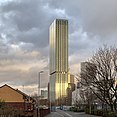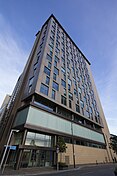
Salford is a city and the main district within the City of Salford, Greater Manchester, England. It is directly west of Manchester city centre in a meander of the River Irwell, which forms part of its boundary with Manchester.

The University of Salford, Manchester is a public university in Salford, Greater Manchester, England, 1 mile west of Manchester city centre. The Royal Technical Institute, Salford, which opened in 1896, became a College of Advanced Technology in 1956 and gained university status in 1967, following the Robbins Report into higher education.

Castlefield is an inner city conservation area of Manchester in North West England. The conservation area which bears its name is bounded by the River Irwell, Quay Street, Deansgate and Chester Road. It was the site of the Roman era fort of Mamucium or Mancunium which gave its name to Manchester. It was the terminus of the Bridgewater Canal, the world's first industrial canal, built in 1764; the oldest canal warehouse opened in 1779. The world's first passenger railway terminated here in 1830, at Liverpool Road railway station and the first railway warehouse opened here in 1831.
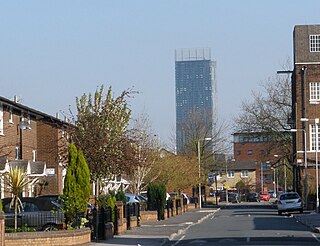
Moss Side is an inner-city area of Manchester, England, 1.9 miles (3.1 km) south of the city centre, It had a population of 18,902 at the 2011 census. Moss Side is bounded by Hulme to the north, Chorlton-on-Medlock, Rusholme and Fallowfield to the east, Whalley Range to the south, and Old Trafford to the west.
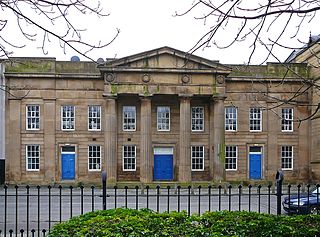
Chorlton-on-Medlock is an inner city area of Manchester, England.

Boddingtons Brewery was a regional brewery in Manchester, England, which owned pubs throughout the North West. Boddingtons was best known for Boddingtons Bitter (Boddies), a straw-golden, hoppy bitter which was one of the first beers to be packaged in cans containing a widget, giving it a creamy draught-style head. In the 1990s, the beer was promoted as The Cream of Manchester in a popular advertising campaign credited with raising Manchester's profile. Boddingtons became one of the city's most famous products after Manchester United and Coronation Street.

The Royal Exchange is a grade II listed building in Manchester, England. It is located in the city centre on the land bounded by St Ann's Square, Exchange Street, Market Street, Cross Street and Old Bank Street. The complex includes the Royal Exchange Theatre and the Royal Exchange Shopping Centre.

Ardwick Green is a public space in Ardwick, Manchester, England. It began as a private park for the residents of houses surrounding it before Manchester acquired it in 1867 and turned it into a public park with an ornamental pond and a bandstand.

Hyde Road was a football stadium in West Gorton, Manchester, England. It was home to Manchester City F.C. and their predecessors from its construction in 1887 until 1923, when the club moved to Maine Road. It was named after Hyde Road, a road which begins at the east end of Ardwick Green South in Ardwick and runs east towards Hyde. At the boundary between Gorton and Denton it continues as Manchester Road.

Ancoats Hospital was the commonly used name for the large inner-city hospital, located in Ancoats, to the north of the city centre of Manchester, England. Its official name was Ancoats Hospital and Ardwick and Ancoats Dispensary from 1875, when it replaced the Ardwick and Ancoats Dispensary that had existed since 1828.
Higsons was a brewery in Liverpool, England, founded in 1780 and closed by Whitbread in 1990. Higsons beer was brewed in Sheffield and Durham after closure before being discontinued. The brand has been revived in the 21st century.

MediaCityUK is a 200-acre (81 ha) mixed-use property development on the banks of the Manchester Ship Canal in Salford and Trafford, Greater Manchester, England. The project was developed by Peel Media; its principal tenants are media organisations and the University of Salford. The land occupied by the development was part of the Port of Manchester and Manchester Docks.

Charrington Brewery was a brewery company founded in Bethnal Green, London in the early 18th century by Robert Westfield. In 1766, John Charrington joined the company, which then traded as Westfield, Moss & Charrington from the Anchor Brewery in Stepney. It merged with United Breweries of London in 1964 to become Charrington United Breweries, then, after acquiring a number of other breweries, it merged with Bass Brewery in 1967 to become the largest UK brewing company, Bass Charrington, later simply Bass plc. The brewing operations of the company were bought by Interbrew in 2000, while the retail side were renamed Six Continents. In 2003 Six Continents split into a pubs business, now known as Mitchells & Butlers, and a hotels and soft drinks business, now known as InterContinental Hotels Group.
Mather & Platt is the name of several large engineering firms in Europe, South Africa and Asia that are subsidiaries of Wilo SE, Germany or were founded by former employees. The original company was founded in the Newton Heath area of Manchester, England, where it was a major employer. That firm continues as a food processing and packaging business, trading as M & P Engineering in Trafford Park, Manchester.

Stones Brewery was a brewery founded in 1868 by William Stones in Sheffield, West Riding of Yorkshire, England, and purchased by Bass Brewery in 1968. After its closure in 1999, its major brand, Stones Bitter, has continued to be produced by the Molson Coors Brewing Company.
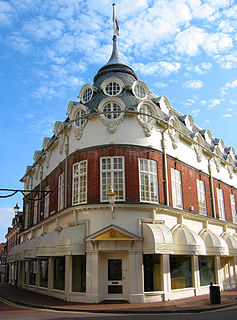
1–5 Pillory Street is a large curved corner block in Nantwich, Cheshire, England, in the French Baroque style of the late 17th century, which is listed at grade II. It is located on the corner of Hospital Street and Pillory Street, and also includes 2 Hospital Street. Formerly known as Chesters' Stores, it was built in 1911 for the grocer's, P. H. Chesters, to a design by local architect, Ernest H. Edleston (1880–1964). The building has subsequently been used for a variety of retail and wholesale purposes, and it is currently a furniture store.
In the final half of the 19th century Manchester's reputation as a financial and commercial centre was boosted by the unprecedented number of warehouses erected in the city centre. In 1806 there were just over 1,000 but by 1815 this had almost doubled to 1,819. Manchester was dubbed "warehouse city". The earliest were built around King Street although by 1850 warehouses had spread to Portland Street and later to Whitworth Street. They are direct descendants of the canal warehouses of Castlefield.

Fremlin's was a brewery in Maidstone, Kent, England. It was established by Ralph Fremlin in 1861, who eschewed the pub trade and focused on bottled beer, on religious grounds. The beer was known for the distinctive elephant logo on the bottles. The brewery expanded to become the largest in Kent, before going into decline after being purchased by Whitbread in 1967.

The pubs and inns in Buxton are an important part of the historical character of the town of Buxton, Derbyshire, in England. The inns date back to the 16th century and several are listed buildings. Most are within the Conservation Areas of Higher Buxton, Central Buxton and Fairfield.


















